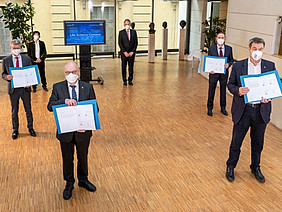The Max Planck Society (MPG) plans to further develop the campus in Martinsried into a flagship for life sciences beyond Germany and Europe. The Free State of Bavaria is supporting the project with up to 500 million euros over the next ten years. Bavarian Minister President Markus Söder, Bavarian Science Minister Bernd Sibler and Bavarian Minister of Economic Affairs Hubert Aiwanger signed a corresponding Memorandum of Understanding on April 29, 2021 in the Max Planck House in Munich with the President of the Max Planck Society, Martin Stratmann.
Martinsried has already become the centre of the Munich biotech region. In addition to the Max Planck Institutes for Biochemistry and Neurobiology, the location also includes facilities of the University of Excellence Ludwig-Maximilians-Universität München (LMU) as well as a total of almost 100 biotech companies, some of which operate worldwide. The majority of these companies are spin-offs from scientific institutions, many of them from the two Martinsried Max Planck Institutes for Biochemistry and for Neurobiology.
"We want to maintain and strengthen this 'innovation pipeline'," affirmed Bavarian Minister President Markus Söder. Together with the two Munich universities and other scientific institutions in Bavaria, the MPG wants to secure the national and international appeal of the Martinsried campus as a research and technology location through competitive further development.
Work on a new concept for the Max Planck Society campus has already been underway since 2019 due to the age of the campus.
New institute for biological intelligence
To this end, the internationally renowned Max Planck Institute for Neurobiology and the world-renowned Max Planck Institute for Ornithology, which is located in Seewiesen, will merge to form a joint new Max Planck Institute for Biological Intelligence and expand with additional departments over the next few years. The Seewiesen site is to be retained as an outstation for research in natural environments.
Nobel Prize Forge Martinsried
At the same time, the Max Planck Institute for Biochemistry is to be further developed. This Max Planck Institute for Biochemistry can claim no fewer than four Nobel Prize winners: Feodor Lynen, Hartmut Michel, Johann Deisenhofer and Robert Huber are among this research elite. In addition, other top-class scientists such as Axel Ullrich in cancer research or Franz-Ulrich Hartl in protein research have laid decisive foundations.
Quantum technology for a better understanding of cells
This wide range of biomedical and neuroscientific research at the Martinsried Campus is to be complemented by researchers working on the development of new technologies. Machine learning and Big Data will also play a major role here. Especially for modelling complex systems, such as a cell, a brain and the interaction of brains, quantum computers could therefore also become particularly important.
In order to meet the special needs and challenges, especially with regard to the required computer-based equipment, the MPG is considering expanding its computing centre, which has been located in Garching up to now, with an additional site in Martinsried.
Climate-neutral and publicly networked
"We want a climate-neutral research campus that is exemplary in its type and size in Europe," explained President Martin Stratmann. He also said that a transparently designed meeting centre for science and the public is planned near the future underground station in Martinsried. This is where the new buildings will be developed successively from 2023 on.
The planned funding of 500 million euros still has to be approved by the state parliament.

